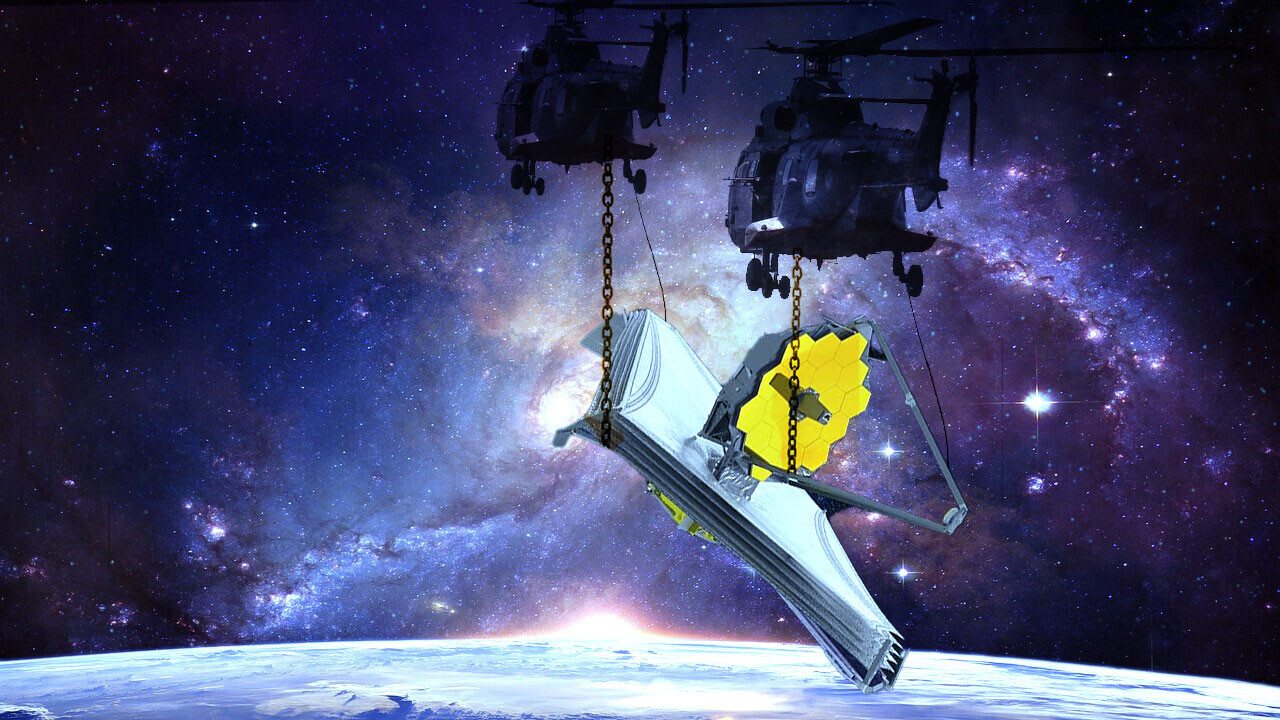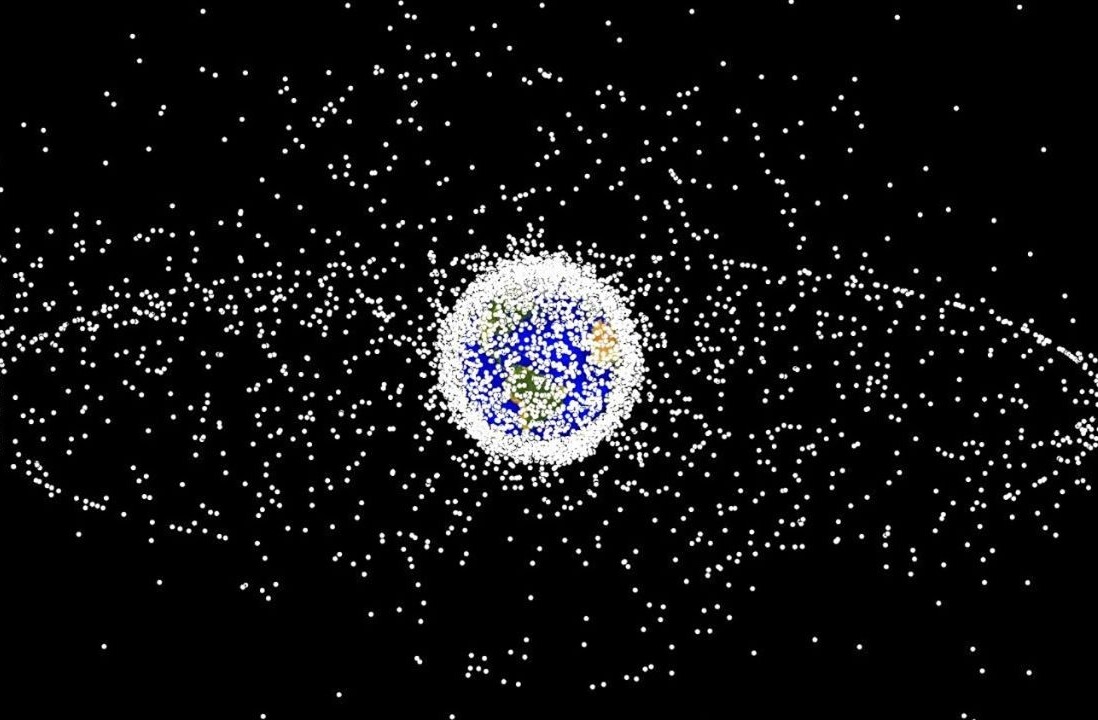
The James Webb space telescope was successfully launched over the weekend. The $10B honeycomb array, which will serve as the spiritual successor to Hubble, is now on its way to Lagrange point two. There, it’ll sit in orbit a million miles away from the planet it was built on.
✅ Milestone achieved. @NASAWebb is safely in space, powered on, and communicating with ground controllers.
The space telescope is now on its way to #UnfoldTheUniverse at its final destination one million miles (1.5 million km) away from Earth. pic.twitter.com/gqICd0Xojz
— NASA (@NASA) December 25, 2021
If something goes wrong now, it’s out of NASA’s hands.
From its vantage point at the L2 boundary, a point in space where the gravitational pull of both the Earth and Moon helps hold an object in a deep orbit, Webb will allow humans to see further into the reaches of space and time than ever before.
At least, we hope it will. As we learned when Hubble launched with a defect: things don’t always go right in space.
In Hubble’s case, NASA’s been able to launch a crewed mission to fix things each time its had a problem requiring hands-on maintenance. If Webb gets on spot and something goes wrong… that’s probably how its story will end.
It’ll be about six month before we know for sure. But, so far, everything’s looking good according to NASA.
Ooh, sick burn! ?
In this case, we’re not talking about insults, but a burn of fuel to adjust #NASAWebb’s trajectory on its million mile (1.5 million km) journey to #UnfoldTheUniverse. #ICYMI, Webb had its first mid-course correction burn Dec. 25: https://t.co/jLXoJoAcXY pic.twitter.com/71U6jbi1vs
— NASA Webb Telescope (@NASAWebb) December 27, 2021
Now seems like a good time to wonder: what could go wrong?
The Webb telescope has dozens of “major deployments” involving micrometer-level precision movements to perform in order to properly function. It has to wind up in just the right spot and activate and operate the most advanced sensors ever sent out into space.
If things don’t align perfectly the whole telescope could end up as a $10 billion paperweight floating through space.
But, that’s the boring space stuff of yesteryear. NASA put the best engineers on the project and we’re just going to have to be happy with that.
Instead, let’s keep in mind that we reached an entirely new class of drama and adventure in our off-planet endeavors in 2021.
We have billionaires waging their own private space race and a US military branch dedicated solely to extraterrestrial operations. We’re blowing up asteroids and still planning a crewed mission to Mars before the decade’s end. Things have changed drastically since the space shuttle era.
If 2022 is as wacky as 2021 was, there’s no predicting what could possibly go wrong when it comes to the James Webb space telescope.
But, here’s the three weirdest (but at least slightly plausible) things we could come up with to help stoke your paranoia ahead of the impending space wars:
Space billionaires
The paradox of wealth is that, at some point, you can have so much of it that it becomes entirely meaningless. Take Jeff Bezos and Elon Musk for example.
Their combined ambition is so great that either of their fortunes alone would count as the most wealth amassed by a single human in history. Together, they’ve pushed the boundaries of technology and commerce. Their empires are so vast that each has extended the reach of their companies beyond the planet itself.
Now what? If Musk and Bezos spent a million dollars every single day, it would take them each over 500 years to go broke. They could build dozens of James Webb space telescopes and still have some change left over.
What’s stopping either of them from littering the Lagrange two point with commercial satellites that clog Webb’s view or, worse, end up smashing into it?
Musk’s already done as much with the orbit around Earth. Scientists say that one in every 15 points of light in the sky visible from Earth will be artificial soon.
There are 2,755 billionaires in the world right now and almost nothing stopping them from doing whatever they want to in space. It’s possible the day could soon come when NASA won’t be able to find an orbit beyond big tech’s reach.
Space Hackers
There are, however, more nefarious concerns beyond a bunch of bumbling billionaires just trying to make a buck.
NASA’s enemies range far and wide and it’s becoming increasingly posh to hack government systems and hold them for ransom thanks to the advent of cryptocurrency.
So, the question is, could the James Webb space telescope be hacked? The answer’s a soft yes. Just about anything can be hacked. But, in this case, satellites are notoriously easy to hack.
However, that also works in Webb’s favor. Because the US government is quite aware of the potential cybersecurity issues with spacecraft and it’s heavily-invested in protecting those assets.
That makes the conversation surrounding a potential Webb takeover a bit moot – we may as well speculate on how the Pentagon could be successfully hacked.
However, there’s almost no such thing as “unhackable,” and that means we shouldn’t rule out a near future where the headlines read “Hackers demand bitcoin for space telescope’s release.”
Space wars
The entire universe beyond Earth’s atmosphere is currently up for grabs. And the US is poised to seize a lion’s share of any available resources – of which the value is virtually unlimited.
And, historically speaking, whenever a new frontier is exploited for resources in such a way that it effects the global economy, war follows.
With Space Force already in place and relations between NASA and Russia’s ROSCOMOS reaching a low point in 2021, there’s every reason to worry about an impending cold war in space.
And, with China and its own divergent plans for expansion into space being kept under cloak and dagger, there’s even more reason for concern.
It’ll be especially interesting to see how the next few decades play out when it comes to political theater in space. Russia, for example, may not be able to build and launch its own James Webb space telescope, but there’s nothing stopping it from building a craft capable of smashing NASA’s.
From the Russian government officially accusing a US astronaut of sabotaging a ROSCOMOS spacecraft to the currently unfolding situation in Ukraine, it’s clear that political tensions are rising between the two nations.
While there’s probably no tactical purpose for targeting the Webb telescope, the political implications would be immense, it would make a great initial test of combat capability, and the potential for unintended casualties would be virtually nonexistent.
At the end of the day, there’s no telling what could go wrong. The most likely scenario is that Webb arrives safely at its intended orbit and helps humanity explore the cosmos. But in this new era of political drama, we should be prepared for anything. Even aliens.
Get the TNW newsletter
Get the most important tech news in your inbox each week.




